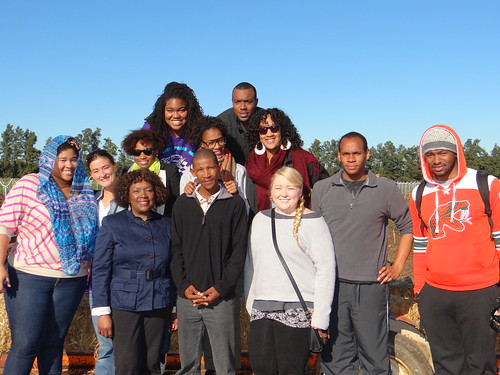
Historically black colleges and universities, particularly the “1890 land-grant universities (LGUs),” have conducted groundbreaking studies to further advance agricultural research in this country, such as eradicating peanut allergens and food borne illnesses. Now, they’re making significant impacts abroad by strengthening U.S. global outreach in agribusiness.
In summers of 2011 to 2015, Florida A&M University (FAMU) students, in collaboration with University of Maryland Eastern Shore (UMES), took part in an 18-day program in South Africa to improve that country’s agricultural performance in table grape and aquaculture production and educational value chains. The trip was supported by USDA’s National Institute of Food and Agriculture (NIFA), through its 1890 Capacity Building Program, and the U.S. Agency for International Development (USAID) Farmer-to-Farmer Program.
According to USDA, South Africa is second largest producer and the fourth largest supplier of table grapes in the southern hemisphere, employing more than 60,000 people to produce 50 million cartons. A few years ago, major flood damage in the Northern Cape region left many table grape producers with no way to harvest their crops, which resulted in some defaulting on bank loans. FAMU faculty and students have since educated the farmers on better business practices, increased productivity, nutrition, and how to seek out alternative financing. Ultimately, two farms received their Fairtrade certification, verifying that their products meet certain environmental, labor, and developmental standards. They have since been able to increase yearly profits and become viable partners in trade.
The FAMU students didn’t limit their time on the farms, however, they also volunteered with the South African 4-H program established by the Saron Primary School. The FAMU students used their knowledge of ag business and hands-on gardening to disprove the notion that agriculture is boring. “As a result of their work, the Saron youth’s negative view of agriculture changed,” said Harriet Paul, project director for FAMU’s College of Agriculture and Food Sciences.
The FAMU student volunteers also helped the Saron students expand their school garden; they have increased the volume of fresh produce available to their school kitchen to support hot lunch meals for an additional 100 students daily.
“Before going to South Africa, my plans were to become a principle of an elementary school. Now I have plans on developing a curriculum in agriculture education and implementing that curriculum in schools worldwide,” said Courtney Wright, a FAMU senior. “This course has taught me that agriculture is a way of life and if we do not begin to teach the new generation of its importance, life will not be sustained.”
Akilah George, a junior in the FAMU’s Agribusiness program, came away with a new appreciation. “Visiting helped me better understand how my classwork can be applied to real-world situations and what my role is as an agribusiness major,” she said.
In May 2015, Agriculture Secretary Tom Vilsack signed an agreement that continues USDA’s commitment to 1890 LGUs for another five years. NIFA is a major provider of funding and national program leadership to 1890 LGUs.
NIFA invests in and advances agricultural research, education, and extension and seeks to make transformative discoveries that solve societal challenges.



